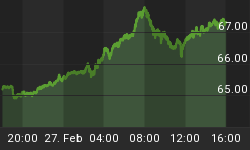Sooner or later, the matter of central banking will again come up for review. But not until we have come to that day when people wonder, just to what end does a central bank function in their interests?
Under Greenspan's reign, the Federal Reserve banks have acquired control of so many markets that the entire financial system might as well become nationalized. Legions of brokers now work as asset gatherers rather than customers' men, who had traditionally built their reputation on working only for, well, the customer. In view of this new order, which affects just about every one on this planet with a bank account, there is perhaps no better timing for this quote except of course (the era) from whence it came:
Mankind soon learns to make interested uses of every right and power, which they possess, or may assume. The public money and public liberty... will soon be discovered to be sources of wealth and dominion to those who hold them; distinguished, too, by this tempting circumstance, that they are the instrument, as well as the object of acquisition. Thomas Jefferson (Notes on Virginia, 1784)
The Real Estate and Mortgage business are next on the Fed's agenda. We've already discussed that in Nominal Net Worth (May 2001).
Maybe one day mankind will again know that each time they ask for help, particularly from their own government, it will ultimately cost certain essential liberties. The layman today believes that the Federal Reserve System exists in order to protect, or guarantee, his and/or his government's money. Does he or she stop to think of how the FRB gets its wherewithal? How it, as custodian of the public money, uses inflation of the public money today in order to both, gain his trust and redirect his savings.
Maybe this would be easier to see if the help came from a foreign government, for our own government evidently doesn't charge for this service.
I saw a T.V. movie about the 1929 stock market crash once, where Jesse Livermore (Reminiscences of a Stock Operator) was in an interview with a reporter, about his bearish market view. The reporter asked, "but sir, I have affidavits from the CEO's of over 100 of the country's biggest blue chip companies that their shares are in fact undervalued."
I don't know if that was actually said or not. The point though is that today, we have to laugh at that. I mean I'm holding my side from the ache of my laughter at the thought of Ron Insana waving such a document on the air at CNBC.
However, the laughter stopped when I realized that such a document does indeed exist. Though the nation's business leaders, whom we might have considered to be the icons of a past era, do not sign it. On the contrary, today, the Federal Reserve Bank of Minneapolis does. But the report is called a research paper instead of an affidavit, and it is called:
The Stock Market: Too High? Too Low? Just Right.
In the June (2001) report, two Fed economists argue why stock prices are not too high, or too low, but just right, and fully justified by theory. Here is their conclusion about early 2000:
The market was not exhibiting irrational stockholder behavior, but instead providing a very good indication of the value of corporate assets.
We will have a closer look at their arguments further below. But what does that say about the state of the union? Is it capitalism that is responsible for the boom of the late nineties, or is it the Fed? The answer lies in what analysts avoid talking about the most, I think. What is it that is the most obvious reason for the rise in asset values, and which is the least discussed? Inflation. And when it is discussed, it is only discussed in terms of the FRB's affidavit that there is no inflation.

Why does industry need a central banking organization to tell them what value is the correct value for the market if it is not part of the industry? Ironically, however, just as the stock market crash of 1929 quickly destroyed the credibility and the public's trust in the nation's business leaders, I think we may see one day how this document and the obstinate dogma of the FRB on matters related to the already controversial productivity debate, too are only as good as the paper they're currently printed on.
I suppose that it will not be until the day when the FRB cannot deliver on its promise of safety then that all hell will break loose. And now, with the stock market hovering atop an affidavit (or the like) commissioned by members of the FRB, which swears that the market is priced fairly, how far could that day be?
Consider that the FOMC just sprayed financial markets with more force than ever - slashing interest rates by 2.75 percent, or by roughly half of what they were.

So what is it going to do when the stock market falls for real this week? Go to zero? Long before then, for unlike Japan the United States is now a net debtor (one of the consequences of forsaking its liberties?), investors will likely recognize that there is no more that the FRB can do to prevent the inevitable.















